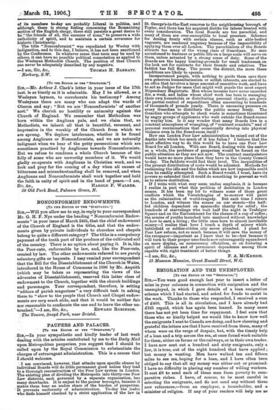PAUPERS AND PALACES. [To THY EDITOR OP TEE " SPECTATOR:1
BI,—In your sympathetic and kindly leader of last week dealing with the articles contributed by me to the Daily Mail upon Metropolitan pauperism you suggest that I should be called upon by the Royal Commission to substantiate the charges of extravagant administration. This is a course that
I should welcome.
I am convinced, however, that attacks upon specific abuses by individual Boards will do little permanent good unless they lead to a thorough reconstruction of the Poor Law system in London. The existing plan of dividing the Metropolis into thirty-one Poor Law districts, each governed by a separate organisation, has many drawbacks. It is unjust to the poorer boroughs, because it makes them bear an undue share of the burden of pauperism. It prevents uniformity of administration. To-day the loafer who finds himself checked by a strict application of the law in St. George's-in-the-East removes to the neighbouring borough of Poplar, and there has his acquired dislike for labour treated with every consideration. The local Boards are too parochial, and many of them are over-susceptible to local pressure. Schemes for dealing firmly with certain classes, such as able-bodied vagrants, are rendered nugatory because of the impossibility of applying them over all London. The parochialism of the Boards attracts too many of the wrong class of Guardians. No man accustomed to business or public life on a large scale will serve on them, unless actuated by a strong sense of duty. Some of the Boards are the happy hunting-grounds for small tradesmen on the look out for contracts for their friends and relatives. The faddist has full fling. The poorer the district, the more these conditions are likely to operate.
Inexperienced people, with nothing to guide them save their own generous humanitarianism or selfish interests, are elected to an office that involves a large amount of executive work, and have to act as Judges for cases that might well puzzle the most expert Stipendiary Magistrate. Men whose incomes have never exceeded 30s. a week, and ladies whose chief work has been in managing their own households or distributing personal charity, are given the partial control of expenditure often amounting to hundreds of thousands of pounds yearly. There is unceasing pressure on every Guardian to distribute the public money freely. The Guardian who attempts to check waste is sometimes threatened by angry groups of applicants who wait outside the Board-rooms to waylay him. Is it any wonder that many Boards live in a constant atmosphere of wrangling, of "contract scandals," and of personal recriminations that occasionally develop into physical violence even in the Board-room itself ?
How can London Poor Law administration be raised out of the depths into which too much of it has fallen ? I believe that the most effective way to do this would be to have one Poor Law Board for all London. With one Board, dealing with the matter as a whole, the problems of pauperism would be forced on the public attention as they are not now. The contract manipulators would have no more place than they have in the County Council to-day. The faddists would find their level. The inequalities of the present distribution of costs would be adjusted. Methods for reclaiming the idle and the fallen which are now impossible could then be readily attempted. Such a Board would, I trust, have its powers so extended that it could do something to prevent as well as to relieve destitution.
If I write with what may seem undue emphasis, it is because I realise in part what this problem of destitution in London means. It has been my lot to witness some of those great conflicts which the Verestchagins of to-morrow will paint as the culmination of world-tragedy. But each time I return to London, and witness the scenes on our streets—the half- fed children dependent on spasmodic charity for relief ; the hundreds of starvelings who wait half the night in Trafalgar Square and on the Embankment for the chance of a cup of coffee ; the armies of youths launched into manhood without knowledge of how to earn a living ; the little ones born to almost inevitable misery—I realise that here I touch a depth of misery which battlefield or soldier-ridden city never plumbed. I plead for Poor Law reform, not so much because it will save the money of the ratepayer—important as I know that to be—but because it will turn to their proper uses funds now extravagantly squandered on mere display, on unnecessary officialism, or on fostering a spirit of idleness and of permanent dependence among those capable with right treatment of better things.
15 Museum Mansion, Great Russell Street, W.C.










































 Previous page
Previous page